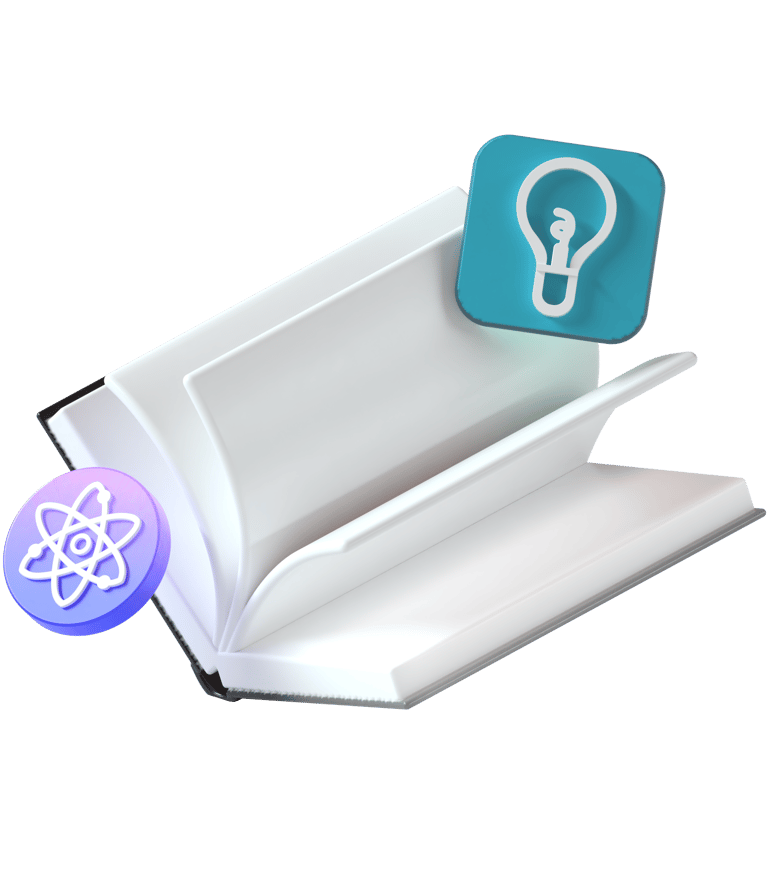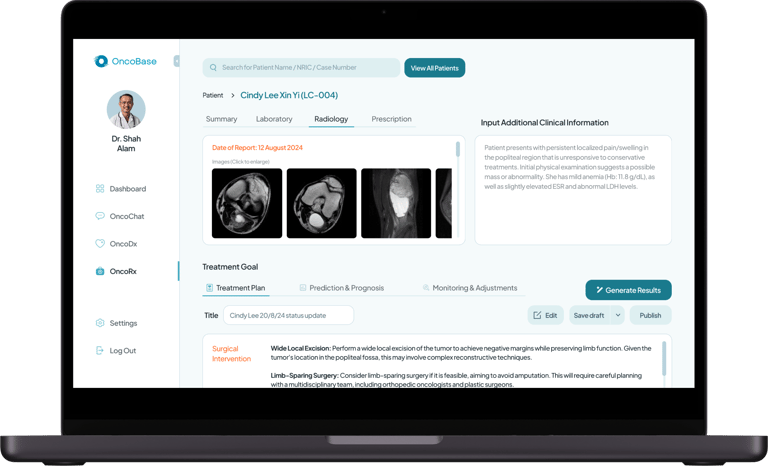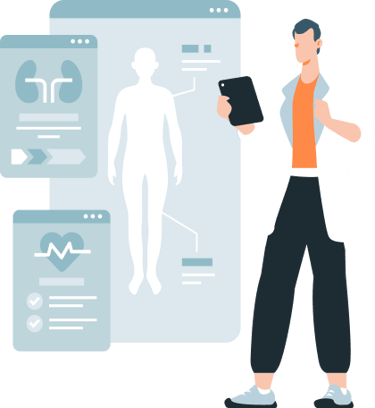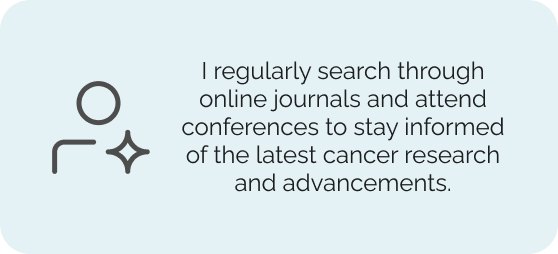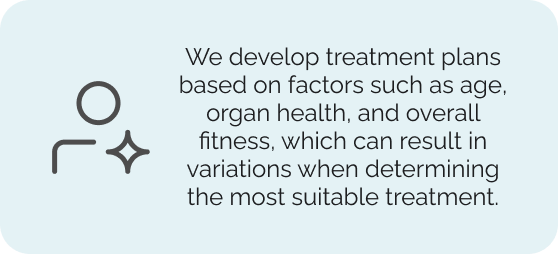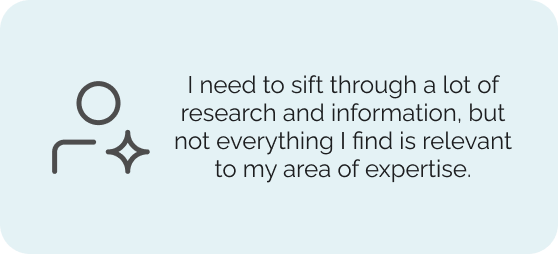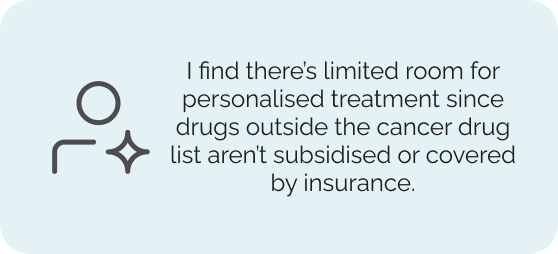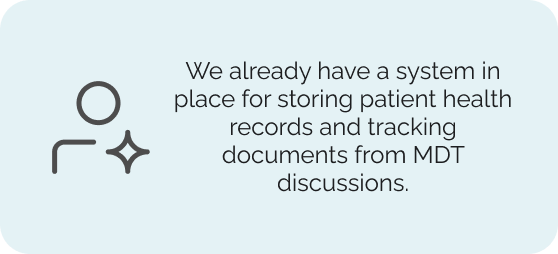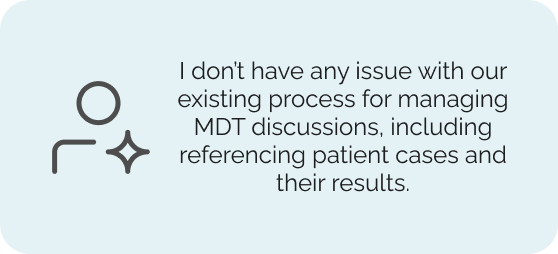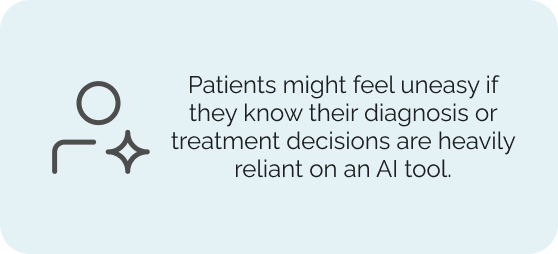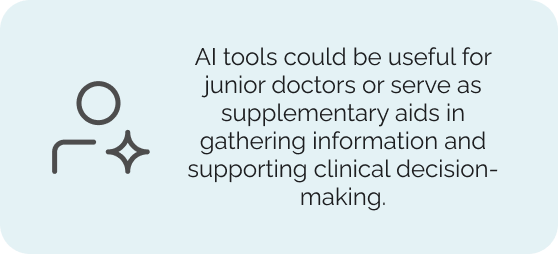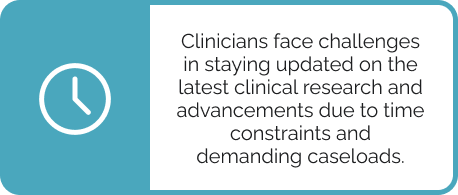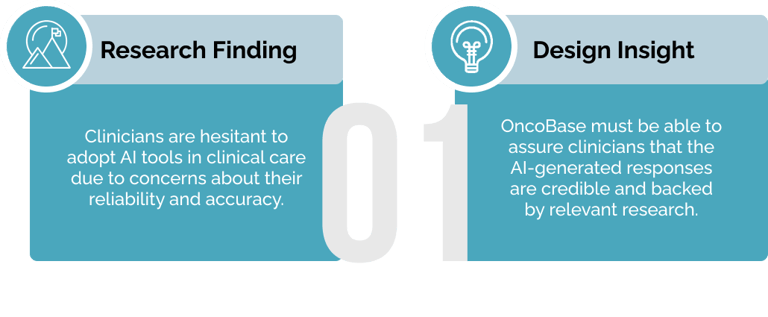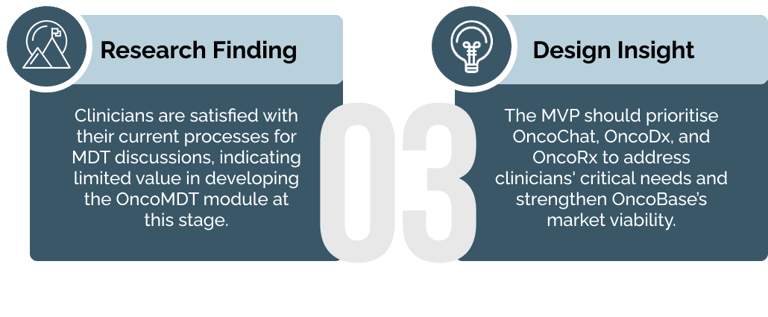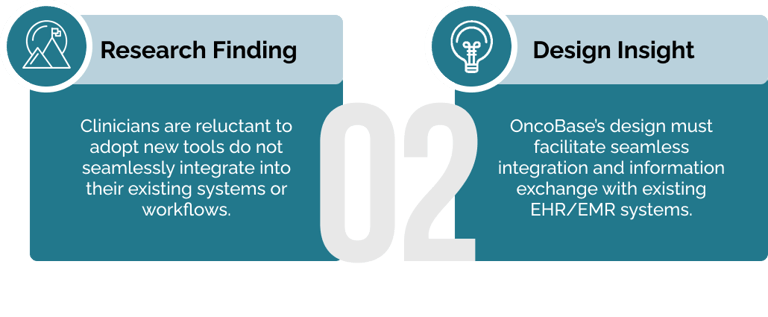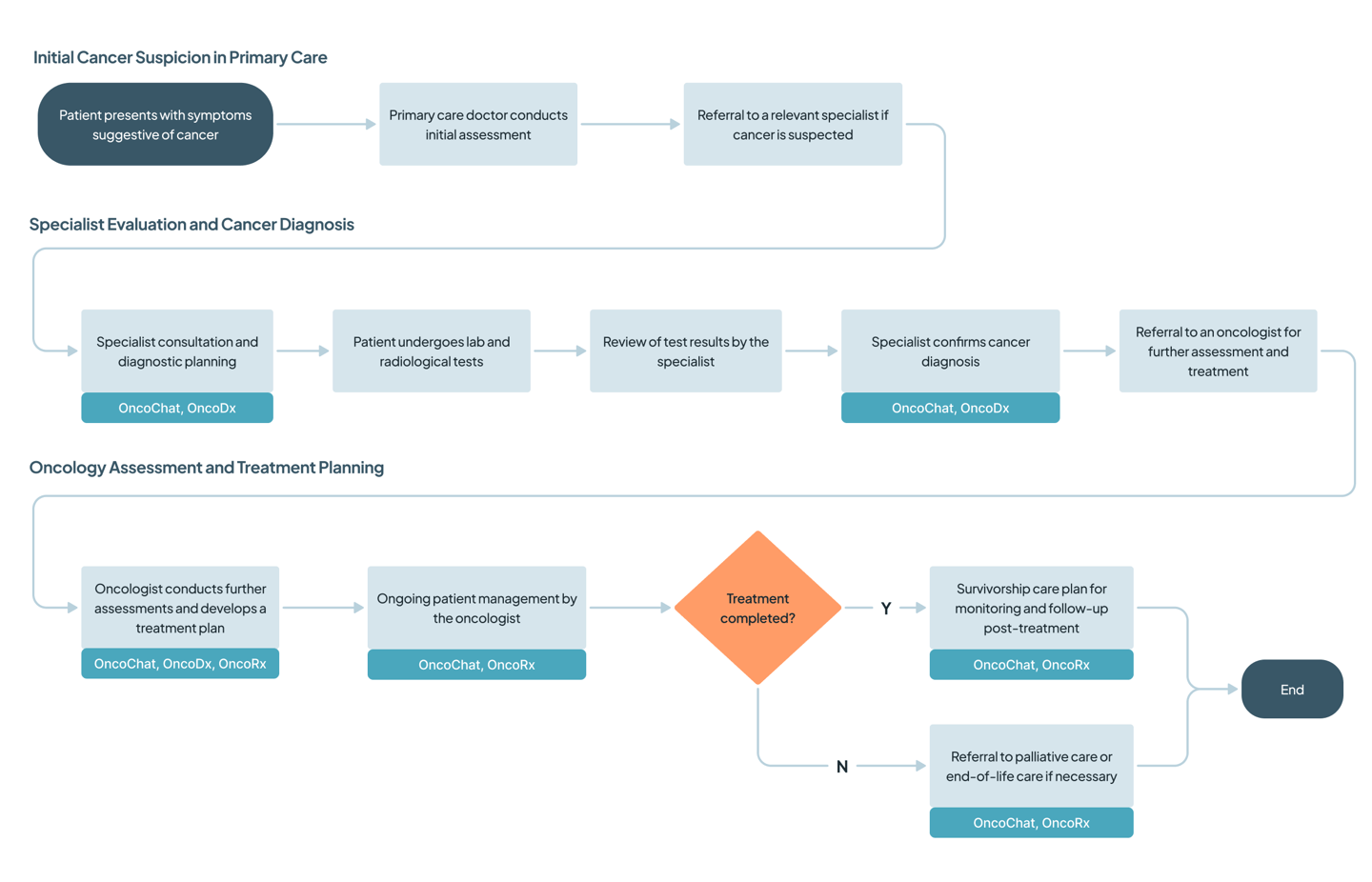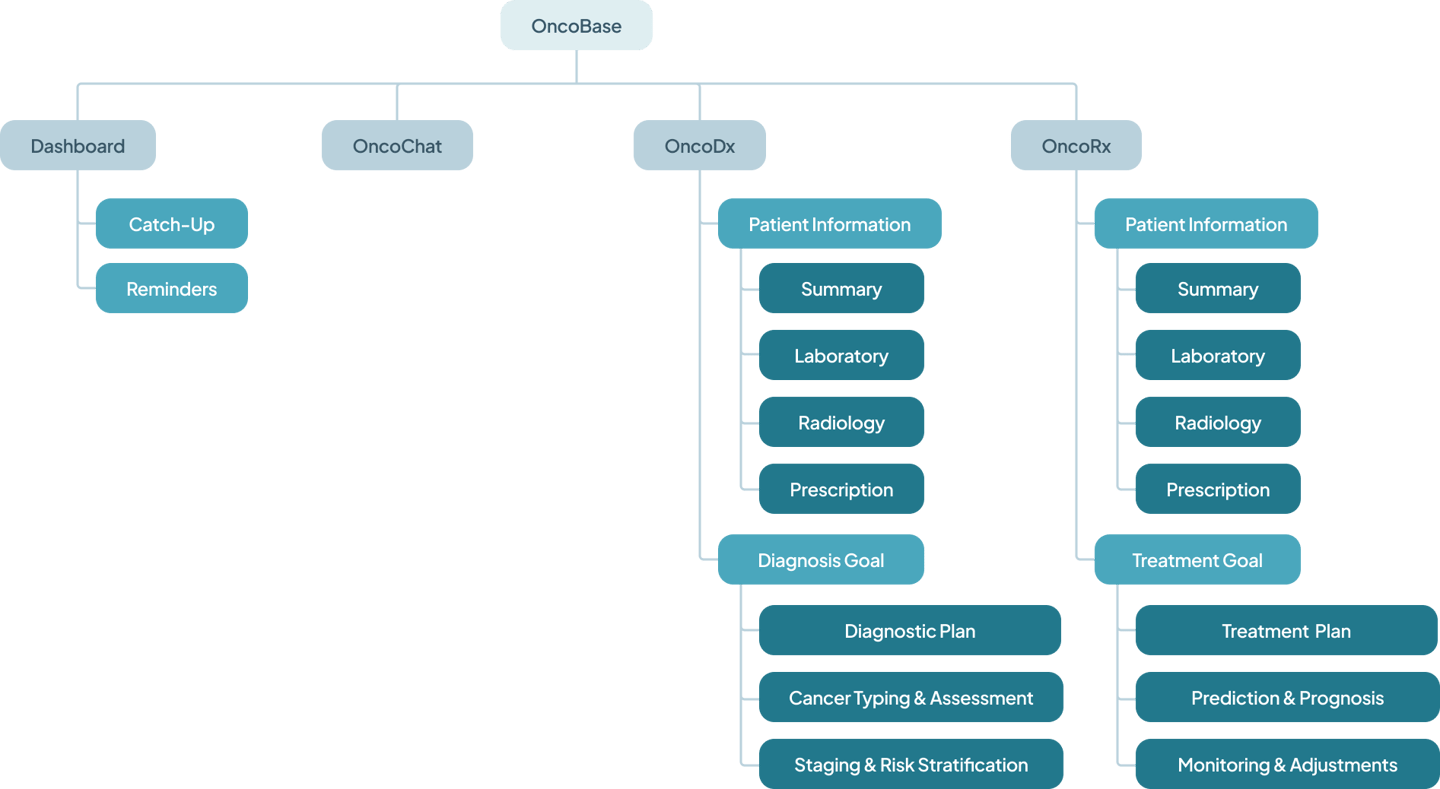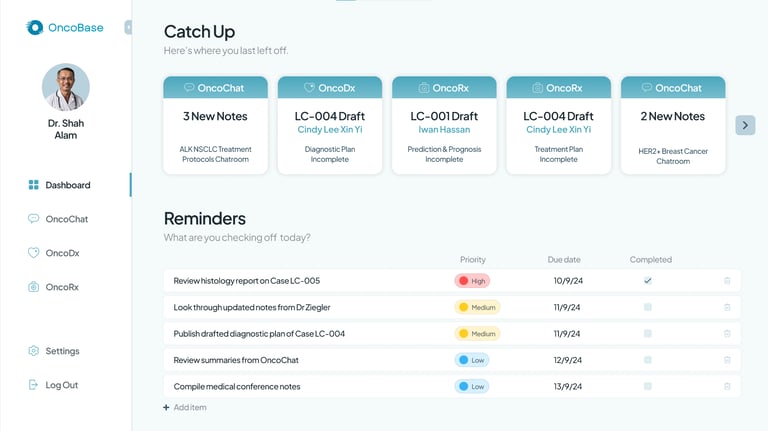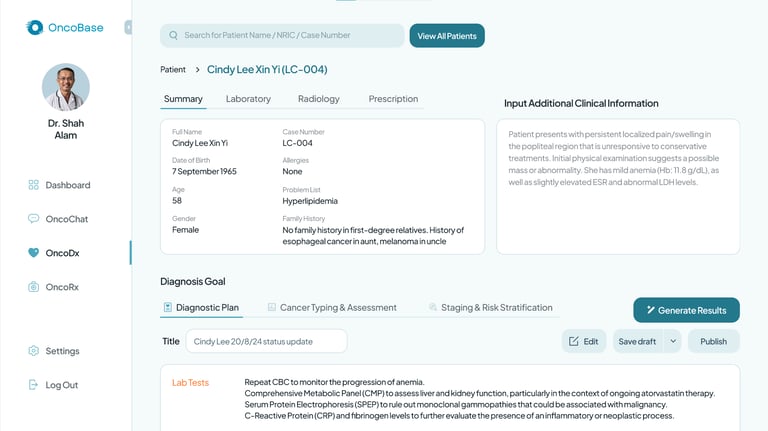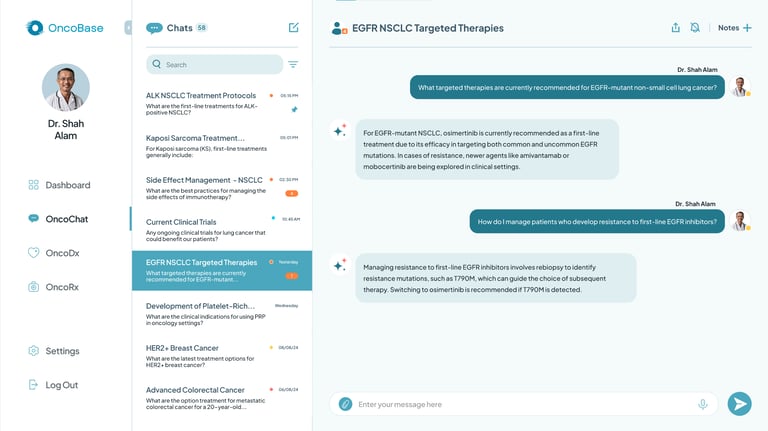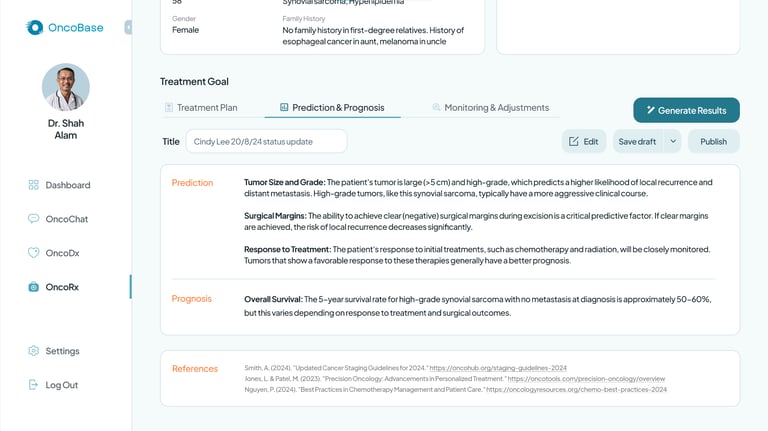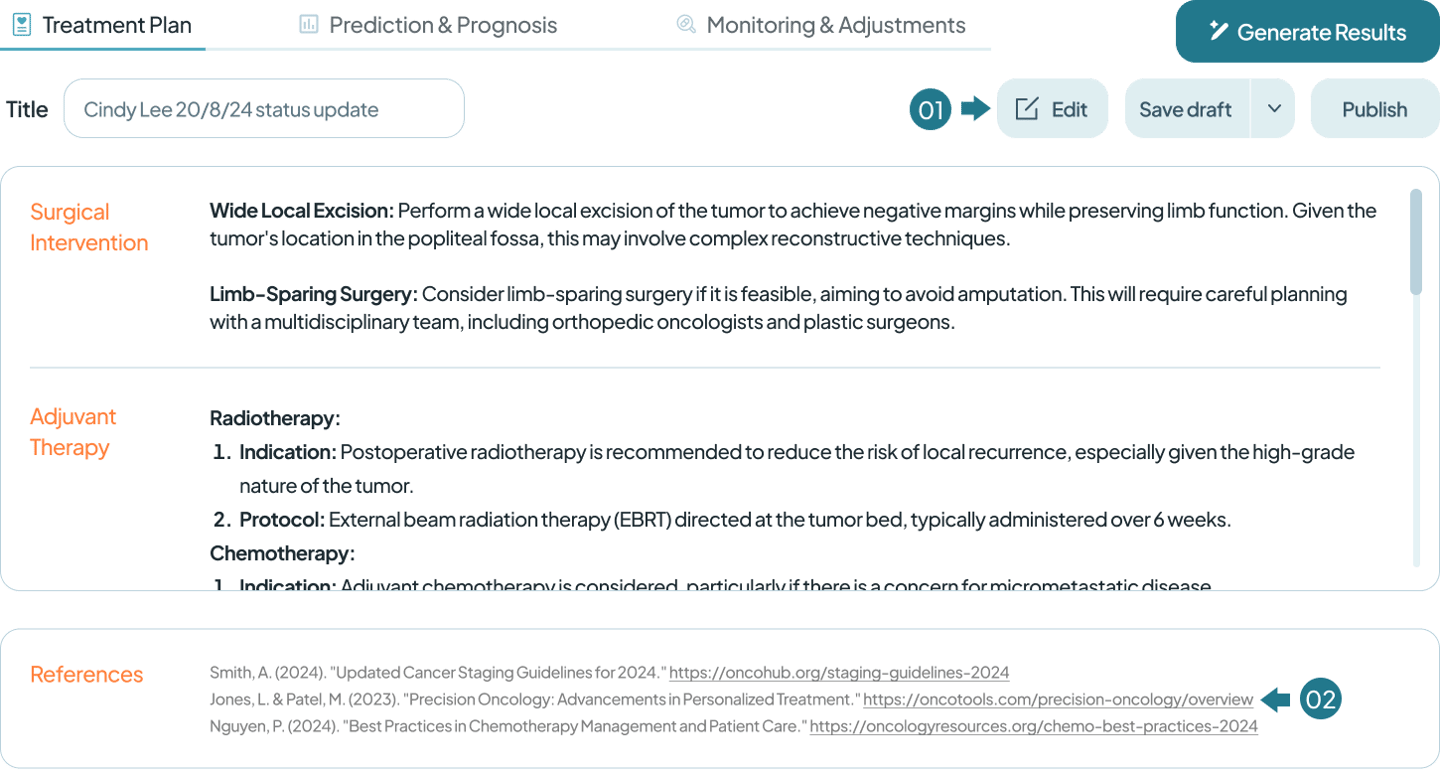OncoBase
Empowering specialists with AI-driven, evidence-based oncology updates and clinical decision support
In this client project with Connectify.AI, we designed a minimum viable product for OncoBase, an AI-powered clinical decision support tool for oncologists and cancer specialists. OncoBase helps specialists stay updated in the rapidly evolving field of oncology by offering a chatbot for evidence-based research, and clinical modules with data-driven recommendations for diagnostics and treatment planning.
Through user research and literature review, we found that clinicians were sceptical of AI tools and hesitant to adopt solutions outside of existing workflows. To address this, we prioritised features that build trust in the credibility of OncoBase’s information and ensured seamless integration with EHR and EMR systems, resulting in a minimally disruptive tool that supports clinicians in making informed decisions in their daily work.
AI-Powered Support for Specialists
30-Second Summary
With continuous advancements in clinical protocols, research discoveries, and treatment innovations, oncology remains one of the fastest-evolving fields in modern medicine. Oncologists face significant challenges in staying up-to-date due to the sheer volume of information and their demanding clinical workloads. Specialists in related fields, whose work may intersect with oncology, also face difficulties in keeping up, particularly when advancements in cancer treatment and research have implications for their own areas of expertise.
Additionally, there is a lack of clinical decision support tools that assist with diagnostic and treatment planning, making it difficult to integrate the latest evidence-based practices into daily patient care.
The Problem
Connectify.AI envisioned OncoBase as a comprehensive, AI-driven platform comprising four core modules, each designed to address critical aspects of oncology care. Together, these modules aimed to optimise cancer diagnostics, treatment planning, and care coordination.
The Original Vision for OncoBase
OncoChat: Designed to provide oncologists with real-time, evidence-based responses to complex medical queries, offering instant access to up-to-date drug information, clinical guidelines, and research findings.
OncoDx: Focused on precision diagnostics by leveraging AI to support cancer typing, staging, and risk stratification through the analysis of pathology slides and radiological imaging.
OncoRx: Aimed at enabling personalised treatment planning through data-driven decisions, predictive modelling, and continuous patient monitoring.
OncoMDT: Intended to streamline multidisciplinary collaboration through a virtual tumour board, enabling specialists to share insights and develop coordinated care plans.
Consultations with Oncologists
We sought to engage oncologists to validate the need for the four envisioned modules and identify essential features to support clinicians in diagnostic and treatment planning workflows. However, securing oncologists for interviews proved to be one of the biggest challenges of our primary research, taking longer than expected and consuming much of the project timeline. Despite extensive outreach efforts, including contacting oncologists in Singapore through LinkedIn and visiting National Cancer Centres in person, participation remained limited. Nonetheless, we managed to conduct in-depth interviews with two oncologists, gaining valuable insights that guided the development of OncoBase.
Q: How do you stay informed about the latest clinical protocols and ongoing clinical trials?
Q: What are some key challenges in diagnosing or treating cancer patients?
Q: What challenges do you face when discussing cases within your multidisciplinary team?
Q: What are your experiences or opinions regarding the use of AI tools in healthcare?
Secondary Research Findings
Due to limited access to oncologists, we supplemented our research with a comprehensive literature review. This approach allowed us to combine insights from the user interviews with established research.
We identified the following challenges faced by clinicians and their views on using AI tools, which aligned with some of our key primary findings and helped to inform the design of OncoBase.
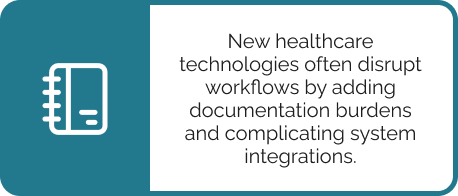

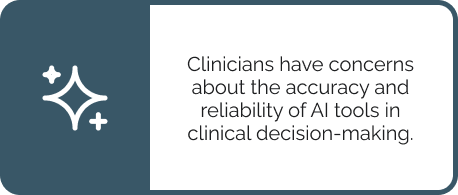

Design Insights
From our extensive research, these are the three key takeaways that guided our design focus for OncoBase.
A Cancer Patient's Journey
Leveraging my healthcare experience and expertise, I mapped out the cancer patient's journey through the healthcare system to identify key stages where OncoBase modules could provide meaningful support in diagnosis and treatment.
By analysing the patient’s journey from initial consultation to treatment and follow-up, we identified where OncoChat, OncoDx, and OncoRx could potentially assist clinicians in accessing relevant information, generating evidence-based diagnostic plans, and formulating personalised treatment strategies to support clinical decision-making during consult.
OncoBase User Flows
I developed a user flow for OncoChat to visualise how clinicians would interact with the module. For OncoDx/OncoRx, I mapped out the clinical decision-making process to ensure the design supports seamless access to evidence-based recommendations at key stages of diagnosis and treatment.
Information Architecture
With clinicians indicating that current MDT processes were effective, we deprioritised the development of OncoMDT, allowing us to focus on the other core modules critical to improving clinical decision-making.
I analysed the structural and design elements of established EHR/EMR systems like Allscripts Sunrise and EpicCare to inform the organisation of patient information and medical data in OncoDx and Rx. This approach enabled us to design corresponding sections for seamless future integration with EHR/EMR platforms.
OncoBase's Screens
The delays in gathering research data and insights had impacted our design timeline. To stay on track, we adopted a desktop-first approach, recognising that clinicians would primarily use OncoBase on a computer. We strategically applied key research insights to guide the design of OncoChat, OncoDx, and OncoRx, ensuring the platform effectively addresses clinicians’ most pressing needs and concerns.
OncoBase's Clinical Trial
01 Allowing Edits to AI-Generated Results
Physicians expressed the need to edit results generated by the OncoDx and OncoRx modules before publishing them to the EHR system, citing potential inaccuracies in the AI's output that may require manual correction. In response, we introduced an "Edit" button next to the generated results, providing a clear and intuitive option for oncologists to modify the information before submission.
02 Providing Direct Links in References Section
Physicians stressed the importance of accessible, credible references to support the AI's findings. While they valued the inclusion of references, they preferred clickable links for easier access. In response to this feedback, we updated the references section to include direct links, allowing users to quickly verify sources without the need for additional searching.
Due to challenges in securing oncologists, we engaged seven family physicians, some of whom are familiar with cancer screening through Singapore's Healthier SG programme, to take part in the usability testing. Alongside minor tweaks such as updating icons for clarity, two key findings prompted further changes in the prototype, detailed below.
The MVP
Future Developments
Clinicians suggested that OncoDx and OncoRx could potentially be combined, as there are overlapping considerations between diagnosis and treatment. For instance, diagnostic information such as cancer typing or the initial diagnostic plan would need to flow into OncoRx to inform treatment planning. Conversely, in cases of cancer recurrence, previous treatment details should flow back into OncoDx to support reassessment and risk stratification. make this alot more concise.
Clinicians highlighted that the care pathway for cancer patients is complex, often requiring input from multiple specialties such as psychiatry and rehabilitation. Ensuring that OncoBase supports a holistic management approach, incorporating inputs from various specialties, will be critical to its success.
While clinicians understand that OncoBase is designed as an AI-powered clinical decision support tool, not a replacement for existing EHR/EMR systems, they emphasised the need for customisation and seamless integration. This would allow OncoBase to fit smoothly into their workflows and reduce the need to manually transcribe recommendations into their EHR/EMR systems.
01 Unifying Diagnosis and Treatment Modules
03 Supporting Holistic Care with Multispecialty Input
02 Streamlining Integration with EHR/EMR Systems
This initial OncoBase prototype is in the early development stage, with several key areas for future development identified from clinician feedback during usability testing. A major gap in the project was limited input from oncologists and specialists, OncoBase's primary users. While the feedback from family physicians was valuable, it highlights the need for closer collaboration with oncologists in future iterations to ensure the clinical relevance and accuracy of the modules.
Given OncoBase’s goal of keeping specialists updated on the latest oncology advancements, some clinicians recommended adding a news feed-style feature to the dashboard. This would provide users with easy access to updates on cancer research, treatments, and protocols relevant to their specialties or interests.
04 Enhancing the Dashboard with Oncology Updates
Afterthoughts 💬
The OncoBase project demanded strong project management due to the unexpected challenges in securing oncologists for interviews, requiring timeline adjustments. I played a key role in managing these challenges while driving client discussions, drawing on my healthcare management expertise to align the project with clinical workflows and clinician preferences. These insights were validated through user interviews and usability testing, enabling us to create a product that addressed clinician needs while maintaining project momentum. This experience deepened my ability to manage complex timelines and deliver user-centric solutions despite unforeseen obstacles.

